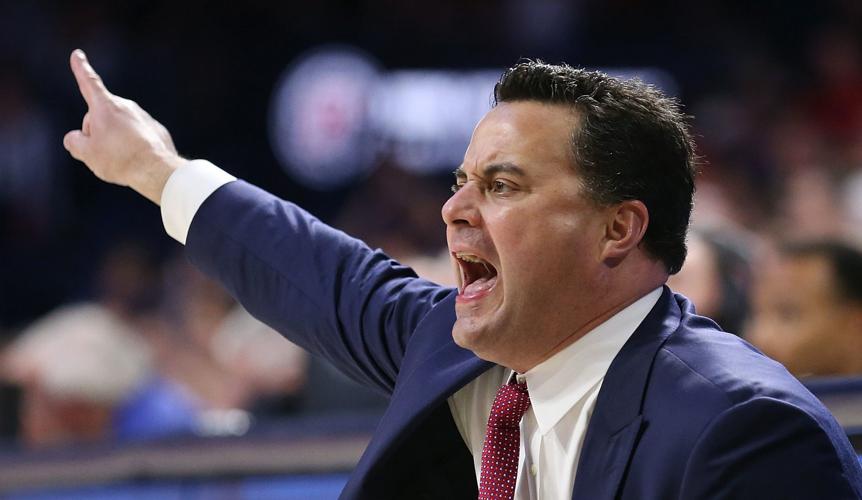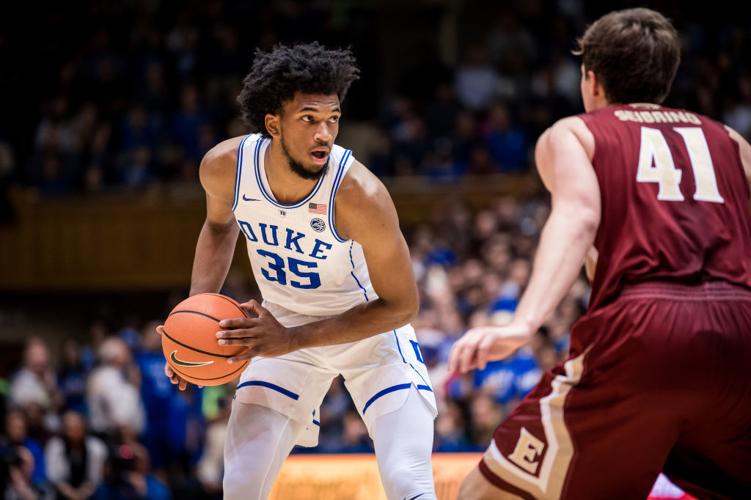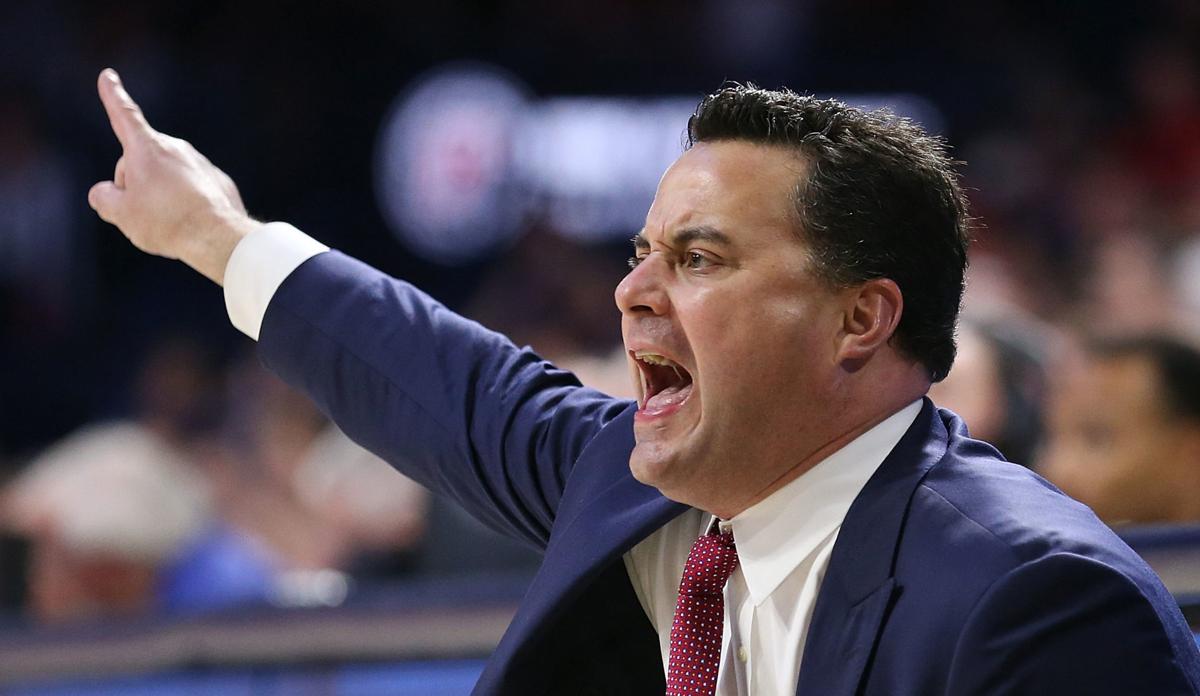Possibly because they are waiting to see if additional evidence might surface, defense attorneys have not filed another request to have Arizona coach Sean Miller testify in the current college basketball corruption trial.
U.S. District Court Judge Edgardo Ramos initially sided with prosecutors’ motion not to allow Miller to testify, saying his actions were irrelevant to the charges facing defendant Christian Dawkins. Ramos said again Thursday nothing had changed in his stance.
Ramos told defense attorney Steve Haney, however, that he could file a second motion in writing. Haney had initially asked Ramos to reconsider, saying videotape of Dawkins discussing his relationship with Miller made the UA coach’s testimony relevant. Dawkins and former Adidas rep Merl Code are both facing felony bribery charges. Prosecutors say they bribed college assistant coaches, who then promised to funnel their best players to the men for professional representation.
In the FBI video, filmed in June 2017 and shown to jurors this week, Dawkins said Miller told him he was “taking care of everything myself” regarding incoming freshman Deandre Ayton, and that Miller wanted to “turn everything over” to the aspiring agent. Miller said more than a year ago that he had never paid — and will never pay — a player or his family member or representative to come to Arizona.
U.S. attorney Noah Solowiejczyk told Ramos on Thursday that if the judge was willing to reconsider allowing Miller to testify, then prosecutors wanted to respond in writing.
“Our understanding of Mr. Haney’s purpose in trying to call Sean Miller is to somehow establish that since Christian Dawkins didn’t seek to bribe him, he must not have sought to bribe these other coaches,” Solowiejczyk said, according to court transcripts. “I’d also note there was some testimony with — in the first meeting that we listened to where Christian Dawkins explained on tape why you don’t bribe head coaches but you did bribe assistant coaches which just further undercuts what Mr. Haney is trying to do here. If your Honor is actually considering revisiting this ruling, we’d like to submit something in writing.”
Ramos said he wasn’t going to stop Haney from asking in writing, but that the video had already been presented before his initial decision to disallow testimony from Miller and therefore “nothing has changed.”
Sood testifies about Richardson payment
The federal bribery trial continued Friday, with more testimony coming from government witness Marty Blazer and Dawkins’ former partner, Munish Sood.
Sood laid out facts about former UA assistant Book Richardson that were consistent with information presented in the September 2017 federal compliant. Sood testified Friday that the undercover FBI agent posing as an investor handed Richardson $15,000 in the summer of 2017, according to court transcripts.
Sood also testified that he met with with Richardson in a lounge at the MGM Grand in Las Vegas in March 2017 — likely before the Pac-12 Tournament — about “access to, hopefully, some of (Richardson’s) top players,” CBS Sports’ Matt Norlander reported.
In a wiretapped phone call from April 24, 2017, Richardson apologized to Sood for not connecting a few days earlier in New York, according to CBS Sports. Richardson told Sood: “I’m gonna over-deliver and under-promise.”
Sood testified that “I believe he was saying if we were helping him to recruit, he was going to deliver one or two players for us,” CBS Sports reported.
Richardson reached a plea agreement in January, telling a federal judge he accepted $20,000 in exchange for a promise to steer current Wildcats to Dawkins and Sood for professional representation.
Prosecutors said Richardson planned to use $15,000 of it to lure a prized recruit, believed to be New Jersey guard Jahvon Quinerly, to Arizona.
Quinerly committed to UA on Aug. 8, 2017, then decommitted three weeks after the federal complaints first surfaced. He spent his freshman season at Villanova and is now looking to transfer.

Former Duke Blue Devil Marvin Bagley was the No. 2 overall pick to the Sacramento Kings in the 2018 NBA draft.
Bagley-related allegations denied
Jurors were shown a video Thursday of TCU assistant coach Corey Barker and Creighton assistant Preston Murphy each accepting $6,000 from Dawkins and an undercover FBI agent, while Blazer testified that then-USC coach Tony Bland received $13,000 at the same meeting.
On video, Bland said he would use the money to recruit Marvin Bagley III, a former Tempe Corona del Sol High School and Phoenix Hillcrest Prep standout who planned to reclassify so he could enroll in college sooner. Blazer testified that “Tony needed money to get to Marvin.”
Bland’s attorney, Jeffrey Lichtman, issued a statement to the Los Angeles Times on Friday saying, “False, fabricated, fake, perjurious. Somehow the government never suggested to me that this occurred or asked Tony to plead to it — because it didn’t occur. Leave Marvin Bagley out of this garbage.”
Bagley’s father launched a public defense on social media. The Team Bagley Twitter account replied to Norlander’s tweet about Blazer’s testimony, saying: “Those gentlemen can talk about whatever they want. Please know Marvin Bagley III nor ANY member of his family has EVER discussed any ‘recruitment and payment scheme’ with either of these gentlemen or anyone for that matter.”
Blazer was cross-examined Friday, with attorneys for Dawkins and Code pointing out inconsistencies in his testimony, highlighting his past crimes and attempting to paint the government witness as a habitual liar. Blazer pleaded guilty in 2017 to wire fraud, securities fraud, aggravated identity theft and making false statements and documents in a separate case. He faces up to 67 years in prison.
Blazer said Friday that he hopes to avoid prison entirely because of his longstanding cooperation with the government in the bribery case, CBS Sports reported.
Resume-building
For most of four days, Blazer was asked by prosecuting attorneys to add context to — and, in some cases, interpret — statements made on FBI videos. Prosecutor Robert Boone asked Blazer on Thursday what Code meant when he said on tape that Richardson’s “concern is about the next kid and being able to take care of whatever situations are coming up.”
“I understood that to mean Book … players that he was coaching at Arizona were going to elevate into the professional ranks,” Blazer said, according to court transcripts. “Book’s concern was more about recruiting and recruiting from that grassroots level, and what Book needed money-wise to recruit that player at the grassroots level to encourage them to come to or incentivize them to come to Arizona.
“So, Book’s concern was the grassroots level, was recruiting and what money was needed to ensure that he recruited the highest level elite basketball players to come to Arizona. And that’s what he was going to be — that was the standard by which he was going to be elevated eventually to a head coaching level.”






